International Resourcing and Talent Planning: A Unilever Report
VerifiedAdded on 2023/01/05
|8
|2145
|70
Report
AI Summary
This report provides a comprehensive analysis of international resourcing and talent planning, focusing on the case of Unilever, a multinational consumer goods company. The study examines the alignment of HR strategies with overall organizational objectives, emphasizing the importance of strategic planning, resourcing, and talent management. It delves into how Unilever integrates its HR practices to support its global operations and gain a competitive advantage. The report also explores the external factors impacting resource and talent planning, utilizing the PESTLE framework to assess political, economic, social, technological, legal, and environmental influences. It highlights how Unilever adapts to these external challenges, including adapting to political stability, economic competition, social trends, technological advancements, legal regulations, and environmental sustainability. The report emphasizes the need for effective recruitment, training, and diversity initiatives to maintain a productive and efficient workforce. The conclusion underscores the significance of proactive HR strategies and adaptability in the international business environment.
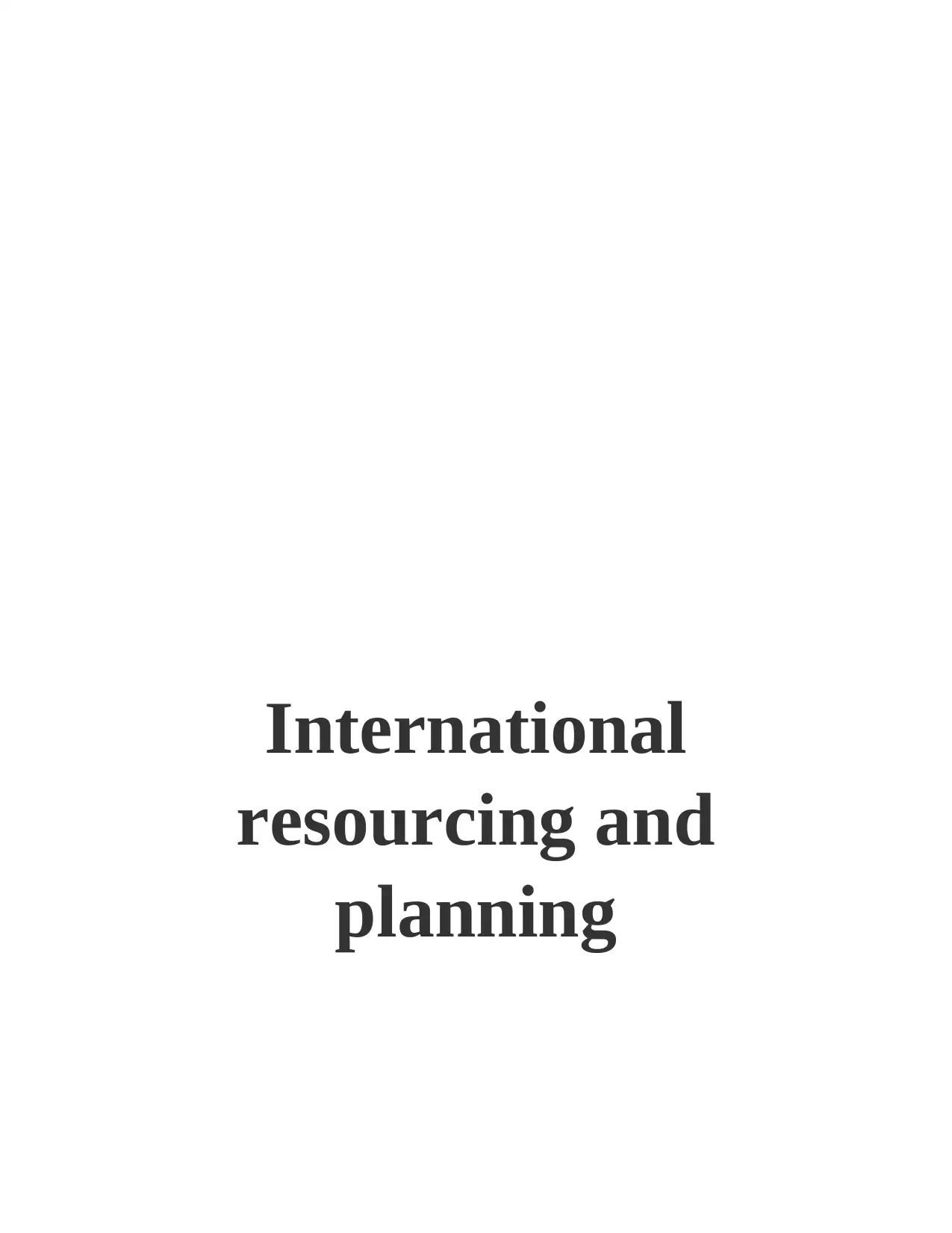
International
resourcing and
planning
resourcing and
planning
Paraphrase This Document
Need a fresh take? Get an instant paraphrase of this document with our AI Paraphraser
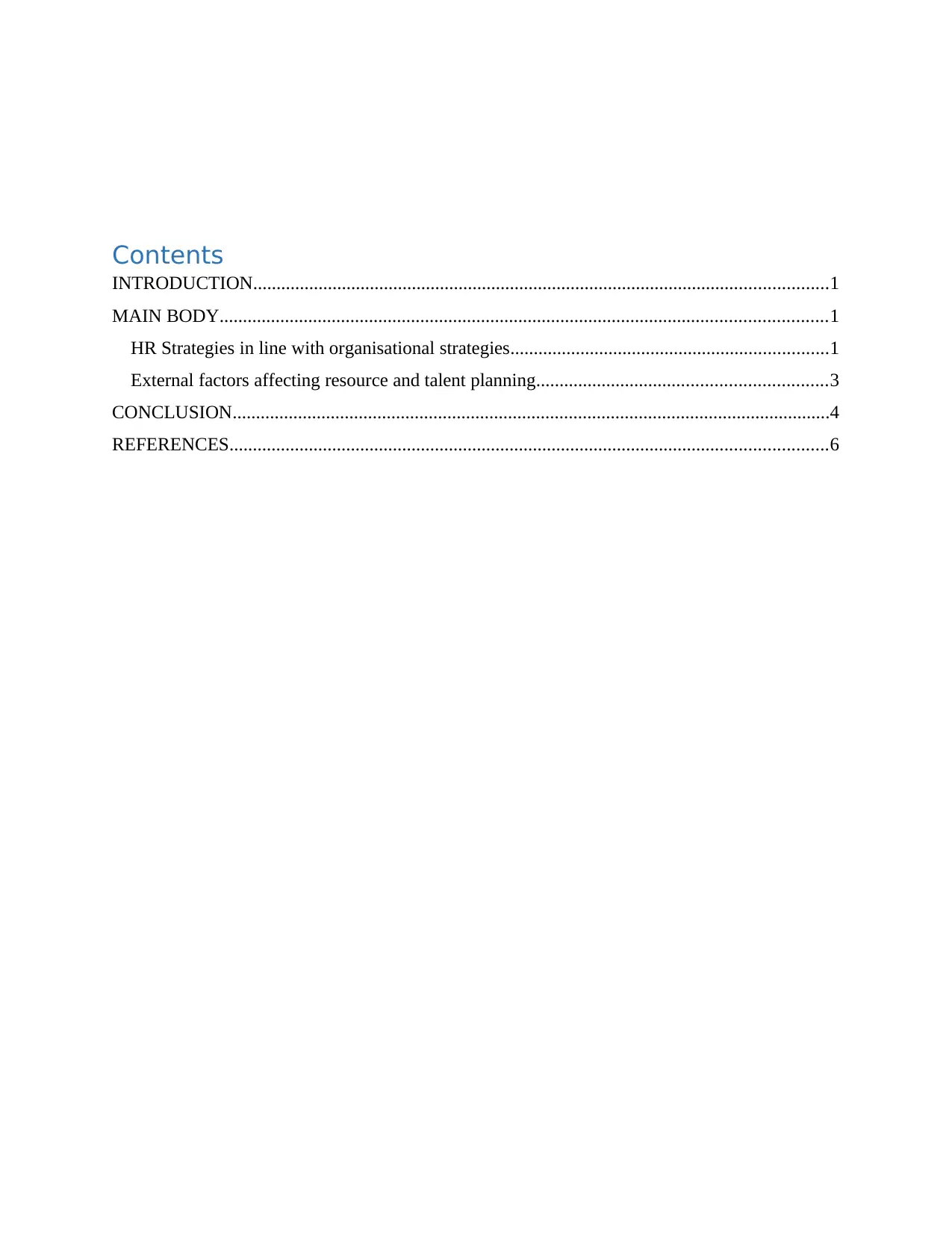
Contents
INTRODUCTION...........................................................................................................................1
MAIN BODY..................................................................................................................................1
HR Strategies in line with organisational strategies....................................................................1
External factors affecting resource and talent planning..............................................................3
CONCLUSION................................................................................................................................4
REFERENCES................................................................................................................................6
INTRODUCTION...........................................................................................................................1
MAIN BODY..................................................................................................................................1
HR Strategies in line with organisational strategies....................................................................1
External factors affecting resource and talent planning..............................................................3
CONCLUSION................................................................................................................................4
REFERENCES................................................................................................................................6
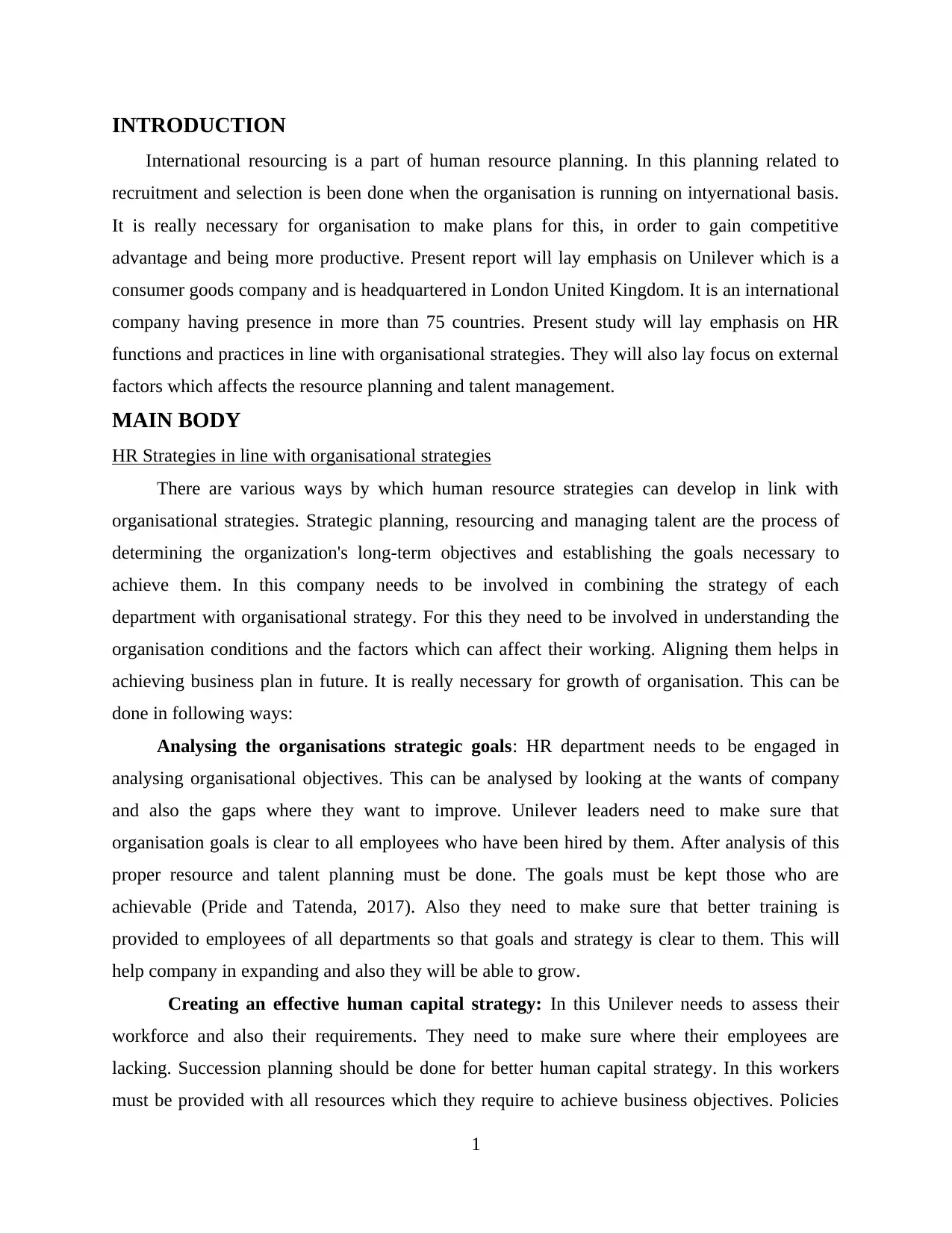
INTRODUCTION
International resourcing is a part of human resource planning. In this planning related to
recruitment and selection is been done when the organisation is running on intyernational basis.
It is really necessary for organisation to make plans for this, in order to gain competitive
advantage and being more productive. Present report will lay emphasis on Unilever which is a
consumer goods company and is headquartered in London United Kingdom. It is an international
company having presence in more than 75 countries. Present study will lay emphasis on HR
functions and practices in line with organisational strategies. They will also lay focus on external
factors which affects the resource planning and talent management.
MAIN BODY
HR Strategies in line with organisational strategies
There are various ways by which human resource strategies can develop in link with
organisational strategies. Strategic planning, resourcing and managing talent are the process of
determining the organization's long-term objectives and establishing the goals necessary to
achieve them. In this company needs to be involved in combining the strategy of each
department with organisational strategy. For this they need to be involved in understanding the
organisation conditions and the factors which can affect their working. Aligning them helps in
achieving business plan in future. It is really necessary for growth of organisation. This can be
done in following ways:
Analysing the organisations strategic goals: HR department needs to be engaged in
analysing organisational objectives. This can be analysed by looking at the wants of company
and also the gaps where they want to improve. Unilever leaders need to make sure that
organisation goals is clear to all employees who have been hired by them. After analysis of this
proper resource and talent planning must be done. The goals must be kept those who are
achievable (Pride and Tatenda, 2017). Also they need to make sure that better training is
provided to employees of all departments so that goals and strategy is clear to them. This will
help company in expanding and also they will be able to grow.
Creating an effective human capital strategy: In this Unilever needs to assess their
workforce and also their requirements. They need to make sure where their employees are
lacking. Succession planning should be done for better human capital strategy. In this workers
must be provided with all resources which they require to achieve business objectives. Policies
1
International resourcing is a part of human resource planning. In this planning related to
recruitment and selection is been done when the organisation is running on intyernational basis.
It is really necessary for organisation to make plans for this, in order to gain competitive
advantage and being more productive. Present report will lay emphasis on Unilever which is a
consumer goods company and is headquartered in London United Kingdom. It is an international
company having presence in more than 75 countries. Present study will lay emphasis on HR
functions and practices in line with organisational strategies. They will also lay focus on external
factors which affects the resource planning and talent management.
MAIN BODY
HR Strategies in line with organisational strategies
There are various ways by which human resource strategies can develop in link with
organisational strategies. Strategic planning, resourcing and managing talent are the process of
determining the organization's long-term objectives and establishing the goals necessary to
achieve them. In this company needs to be involved in combining the strategy of each
department with organisational strategy. For this they need to be involved in understanding the
organisation conditions and the factors which can affect their working. Aligning them helps in
achieving business plan in future. It is really necessary for growth of organisation. This can be
done in following ways:
Analysing the organisations strategic goals: HR department needs to be engaged in
analysing organisational objectives. This can be analysed by looking at the wants of company
and also the gaps where they want to improve. Unilever leaders need to make sure that
organisation goals is clear to all employees who have been hired by them. After analysis of this
proper resource and talent planning must be done. The goals must be kept those who are
achievable (Pride and Tatenda, 2017). Also they need to make sure that better training is
provided to employees of all departments so that goals and strategy is clear to them. This will
help company in expanding and also they will be able to grow.
Creating an effective human capital strategy: In this Unilever needs to assess their
workforce and also their requirements. They need to make sure where their employees are
lacking. Succession planning should be done for better human capital strategy. In this workers
must be provided with all resources which they require to achieve business objectives. Policies
1
⊘ This is a preview!⊘
Do you want full access?
Subscribe today to unlock all pages.

Trusted by 1+ million students worldwide
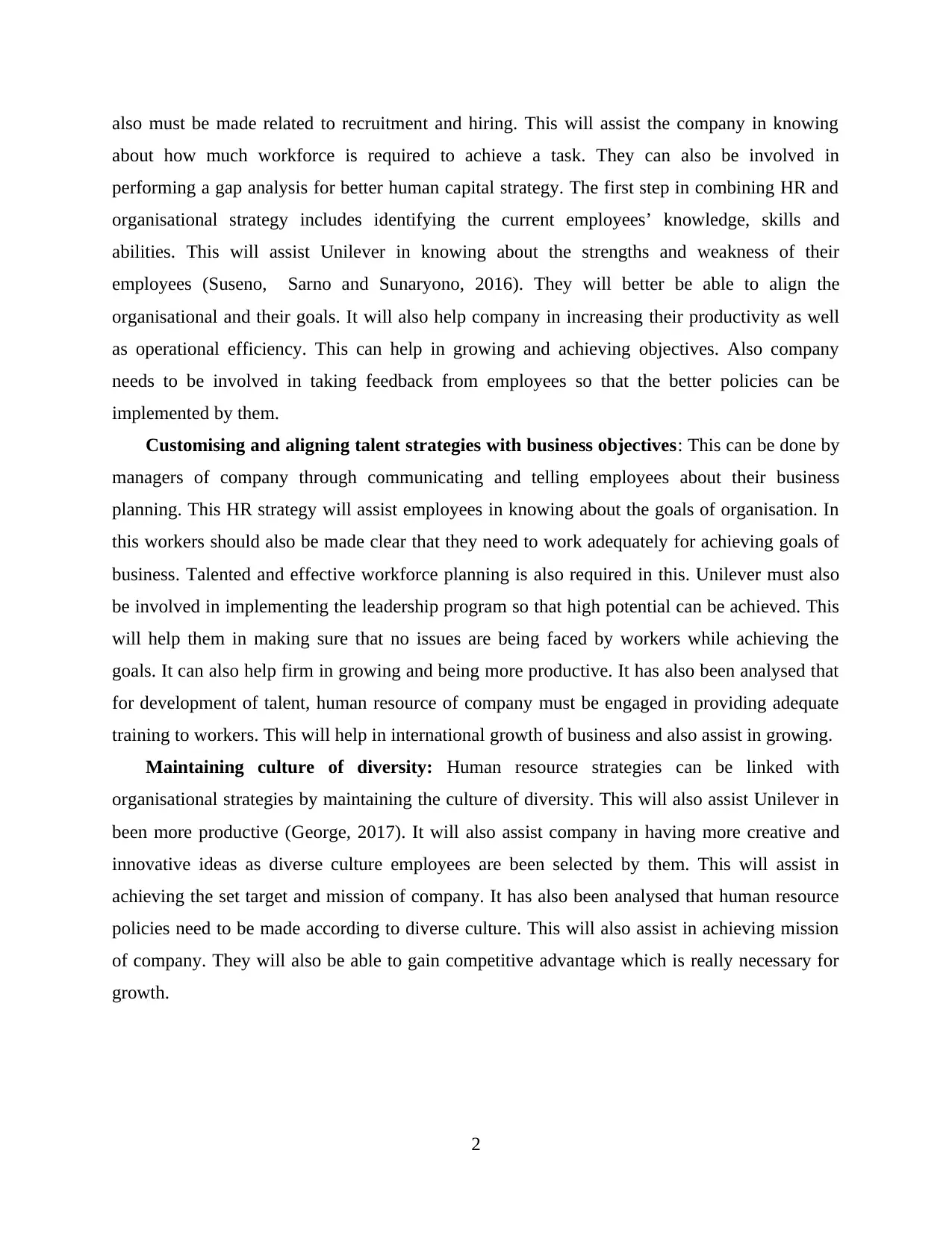
also must be made related to recruitment and hiring. This will assist the company in knowing
about how much workforce is required to achieve a task. They can also be involved in
performing a gap analysis for better human capital strategy. The first step in combining HR and
organisational strategy includes identifying the current employees’ knowledge, skills and
abilities. This will assist Unilever in knowing about the strengths and weakness of their
employees (Suseno, Sarno and Sunaryono, 2016). They will better be able to align the
organisational and their goals. It will also help company in increasing their productivity as well
as operational efficiency. This can help in growing and achieving objectives. Also company
needs to be involved in taking feedback from employees so that the better policies can be
implemented by them.
Customising and aligning talent strategies with business objectives: This can be done by
managers of company through communicating and telling employees about their business
planning. This HR strategy will assist employees in knowing about the goals of organisation. In
this workers should also be made clear that they need to work adequately for achieving goals of
business. Talented and effective workforce planning is also required in this. Unilever must also
be involved in implementing the leadership program so that high potential can be achieved. This
will help them in making sure that no issues are being faced by workers while achieving the
goals. It can also help firm in growing and being more productive. It has also been analysed that
for development of talent, human resource of company must be engaged in providing adequate
training to workers. This will help in international growth of business and also assist in growing.
Maintaining culture of diversity: Human resource strategies can be linked with
organisational strategies by maintaining the culture of diversity. This will also assist Unilever in
been more productive (George, 2017). It will also assist company in having more creative and
innovative ideas as diverse culture employees are been selected by them. This will assist in
achieving the set target and mission of company. It has also been analysed that human resource
policies need to be made according to diverse culture. This will also assist in achieving mission
of company. They will also be able to gain competitive advantage which is really necessary for
growth.
2
about how much workforce is required to achieve a task. They can also be involved in
performing a gap analysis for better human capital strategy. The first step in combining HR and
organisational strategy includes identifying the current employees’ knowledge, skills and
abilities. This will assist Unilever in knowing about the strengths and weakness of their
employees (Suseno, Sarno and Sunaryono, 2016). They will better be able to align the
organisational and their goals. It will also help company in increasing their productivity as well
as operational efficiency. This can help in growing and achieving objectives. Also company
needs to be involved in taking feedback from employees so that the better policies can be
implemented by them.
Customising and aligning talent strategies with business objectives: This can be done by
managers of company through communicating and telling employees about their business
planning. This HR strategy will assist employees in knowing about the goals of organisation. In
this workers should also be made clear that they need to work adequately for achieving goals of
business. Talented and effective workforce planning is also required in this. Unilever must also
be involved in implementing the leadership program so that high potential can be achieved. This
will help them in making sure that no issues are being faced by workers while achieving the
goals. It can also help firm in growing and being more productive. It has also been analysed that
for development of talent, human resource of company must be engaged in providing adequate
training to workers. This will help in international growth of business and also assist in growing.
Maintaining culture of diversity: Human resource strategies can be linked with
organisational strategies by maintaining the culture of diversity. This will also assist Unilever in
been more productive (George, 2017). It will also assist company in having more creative and
innovative ideas as diverse culture employees are been selected by them. This will assist in
achieving the set target and mission of company. It has also been analysed that human resource
policies need to be made according to diverse culture. This will also assist in achieving mission
of company. They will also be able to gain competitive advantage which is really necessary for
growth.
2
Paraphrase This Document
Need a fresh take? Get an instant paraphrase of this document with our AI Paraphraser
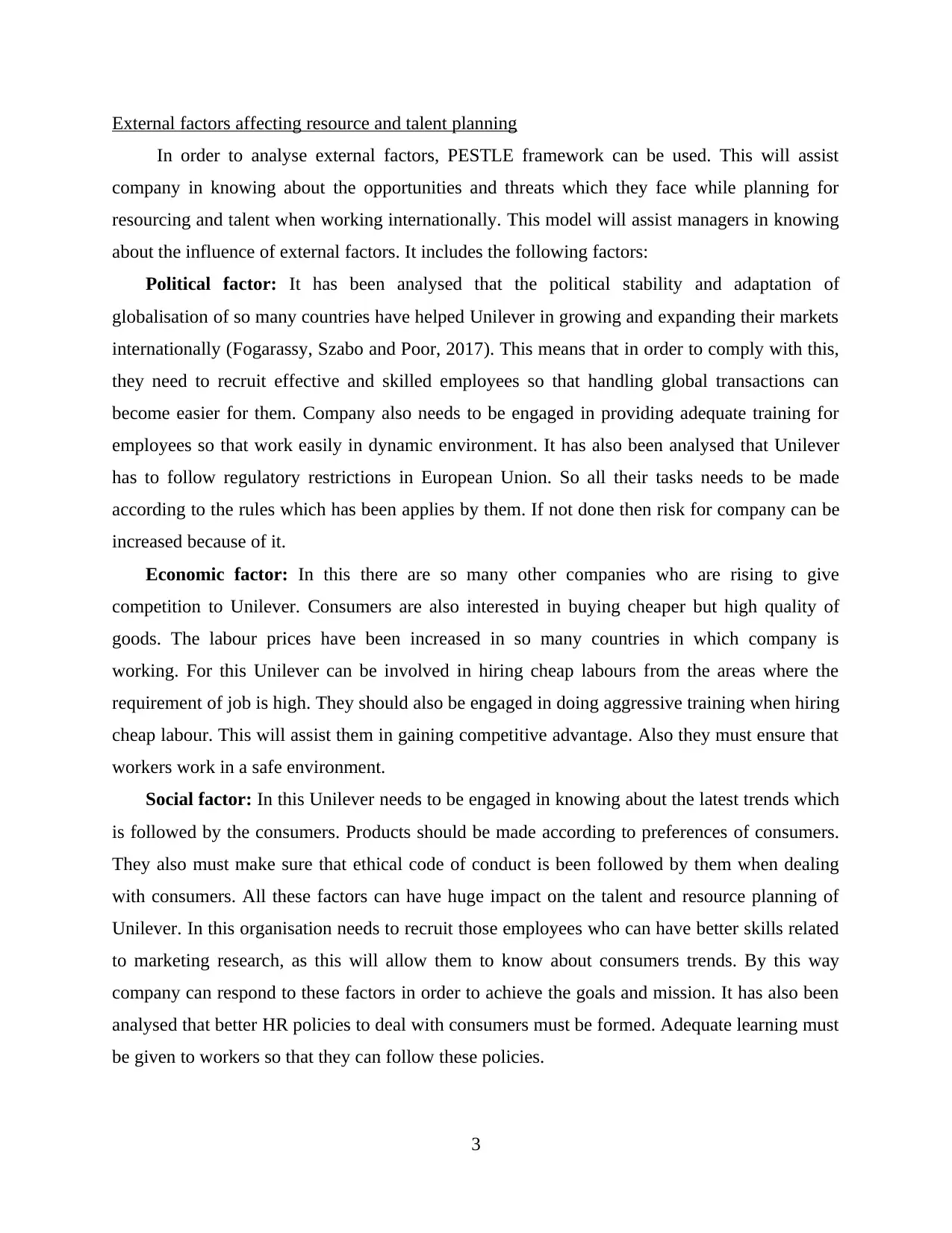
External factors affecting resource and talent planning
In order to analyse external factors, PESTLE framework can be used. This will assist
company in knowing about the opportunities and threats which they face while planning for
resourcing and talent when working internationally. This model will assist managers in knowing
about the influence of external factors. It includes the following factors:
Political factor: It has been analysed that the political stability and adaptation of
globalisation of so many countries have helped Unilever in growing and expanding their markets
internationally (Fogarassy, Szabo and Poor, 2017). This means that in order to comply with this,
they need to recruit effective and skilled employees so that handling global transactions can
become easier for them. Company also needs to be engaged in providing adequate training for
employees so that work easily in dynamic environment. It has also been analysed that Unilever
has to follow regulatory restrictions in European Union. So all their tasks needs to be made
according to the rules which has been applies by them. If not done then risk for company can be
increased because of it.
Economic factor: In this there are so many other companies who are rising to give
competition to Unilever. Consumers are also interested in buying cheaper but high quality of
goods. The labour prices have been increased in so many countries in which company is
working. For this Unilever can be involved in hiring cheap labours from the areas where the
requirement of job is high. They should also be engaged in doing aggressive training when hiring
cheap labour. This will assist them in gaining competitive advantage. Also they must ensure that
workers work in a safe environment.
Social factor: In this Unilever needs to be engaged in knowing about the latest trends which
is followed by the consumers. Products should be made according to preferences of consumers.
They also must make sure that ethical code of conduct is been followed by them when dealing
with consumers. All these factors can have huge impact on the talent and resource planning of
Unilever. In this organisation needs to recruit those employees who can have better skills related
to marketing research, as this will allow them to know about consumers trends. By this way
company can respond to these factors in order to achieve the goals and mission. It has also been
analysed that better HR policies to deal with consumers must be formed. Adequate learning must
be given to workers so that they can follow these policies.
3
In order to analyse external factors, PESTLE framework can be used. This will assist
company in knowing about the opportunities and threats which they face while planning for
resourcing and talent when working internationally. This model will assist managers in knowing
about the influence of external factors. It includes the following factors:
Political factor: It has been analysed that the political stability and adaptation of
globalisation of so many countries have helped Unilever in growing and expanding their markets
internationally (Fogarassy, Szabo and Poor, 2017). This means that in order to comply with this,
they need to recruit effective and skilled employees so that handling global transactions can
become easier for them. Company also needs to be engaged in providing adequate training for
employees so that work easily in dynamic environment. It has also been analysed that Unilever
has to follow regulatory restrictions in European Union. So all their tasks needs to be made
according to the rules which has been applies by them. If not done then risk for company can be
increased because of it.
Economic factor: In this there are so many other companies who are rising to give
competition to Unilever. Consumers are also interested in buying cheaper but high quality of
goods. The labour prices have been increased in so many countries in which company is
working. For this Unilever can be involved in hiring cheap labours from the areas where the
requirement of job is high. They should also be engaged in doing aggressive training when hiring
cheap labour. This will assist them in gaining competitive advantage. Also they must ensure that
workers work in a safe environment.
Social factor: In this Unilever needs to be engaged in knowing about the latest trends which
is followed by the consumers. Products should be made according to preferences of consumers.
They also must make sure that ethical code of conduct is been followed by them when dealing
with consumers. All these factors can have huge impact on the talent and resource planning of
Unilever. In this organisation needs to recruit those employees who can have better skills related
to marketing research, as this will allow them to know about consumers trends. By this way
company can respond to these factors in order to achieve the goals and mission. It has also been
analysed that better HR policies to deal with consumers must be formed. Adequate learning must
be given to workers so that they can follow these policies.
3
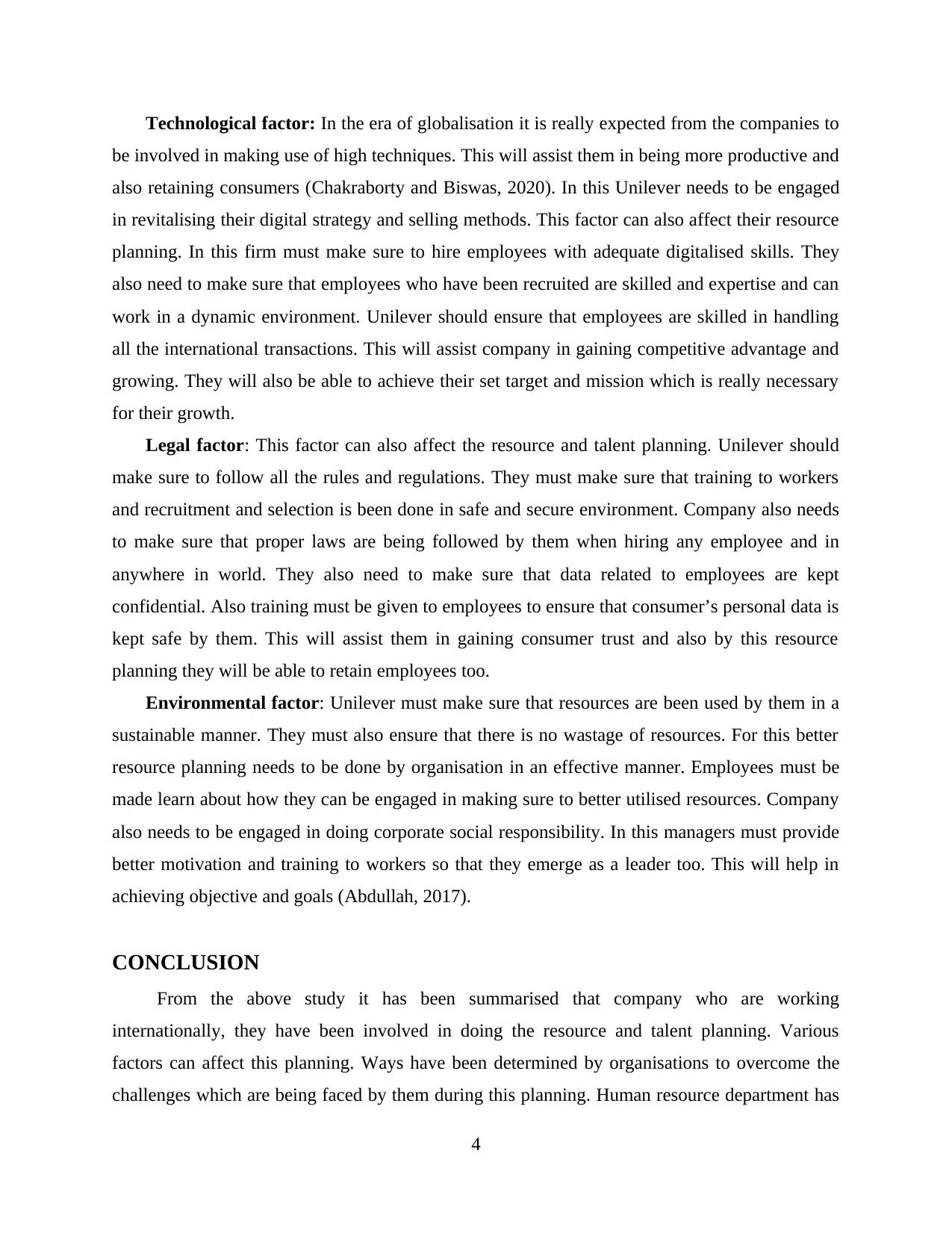
Technological factor: In the era of globalisation it is really expected from the companies to
be involved in making use of high techniques. This will assist them in being more productive and
also retaining consumers (Chakraborty and Biswas, 2020). In this Unilever needs to be engaged
in revitalising their digital strategy and selling methods. This factor can also affect their resource
planning. In this firm must make sure to hire employees with adequate digitalised skills. They
also need to make sure that employees who have been recruited are skilled and expertise and can
work in a dynamic environment. Unilever should ensure that employees are skilled in handling
all the international transactions. This will assist company in gaining competitive advantage and
growing. They will also be able to achieve their set target and mission which is really necessary
for their growth.
Legal factor: This factor can also affect the resource and talent planning. Unilever should
make sure to follow all the rules and regulations. They must make sure that training to workers
and recruitment and selection is been done in safe and secure environment. Company also needs
to make sure that proper laws are being followed by them when hiring any employee and in
anywhere in world. They also need to make sure that data related to employees are kept
confidential. Also training must be given to employees to ensure that consumer’s personal data is
kept safe by them. This will assist them in gaining consumer trust and also by this resource
planning they will be able to retain employees too.
Environmental factor: Unilever must make sure that resources are been used by them in a
sustainable manner. They must also ensure that there is no wastage of resources. For this better
resource planning needs to be done by organisation in an effective manner. Employees must be
made learn about how they can be engaged in making sure to better utilised resources. Company
also needs to be engaged in doing corporate social responsibility. In this managers must provide
better motivation and training to workers so that they emerge as a leader too. This will help in
achieving objective and goals (Abdullah, 2017).
CONCLUSION
From the above study it has been summarised that company who are working
internationally, they have been involved in doing the resource and talent planning. Various
factors can affect this planning. Ways have been determined by organisations to overcome the
challenges which are being faced by them during this planning. Human resource department has
4
be involved in making use of high techniques. This will assist them in being more productive and
also retaining consumers (Chakraborty and Biswas, 2020). In this Unilever needs to be engaged
in revitalising their digital strategy and selling methods. This factor can also affect their resource
planning. In this firm must make sure to hire employees with adequate digitalised skills. They
also need to make sure that employees who have been recruited are skilled and expertise and can
work in a dynamic environment. Unilever should ensure that employees are skilled in handling
all the international transactions. This will assist company in gaining competitive advantage and
growing. They will also be able to achieve their set target and mission which is really necessary
for their growth.
Legal factor: This factor can also affect the resource and talent planning. Unilever should
make sure to follow all the rules and regulations. They must make sure that training to workers
and recruitment and selection is been done in safe and secure environment. Company also needs
to make sure that proper laws are being followed by them when hiring any employee and in
anywhere in world. They also need to make sure that data related to employees are kept
confidential. Also training must be given to employees to ensure that consumer’s personal data is
kept safe by them. This will assist them in gaining consumer trust and also by this resource
planning they will be able to retain employees too.
Environmental factor: Unilever must make sure that resources are been used by them in a
sustainable manner. They must also ensure that there is no wastage of resources. For this better
resource planning needs to be done by organisation in an effective manner. Employees must be
made learn about how they can be engaged in making sure to better utilised resources. Company
also needs to be engaged in doing corporate social responsibility. In this managers must provide
better motivation and training to workers so that they emerge as a leader too. This will help in
achieving objective and goals (Abdullah, 2017).
CONCLUSION
From the above study it has been summarised that company who are working
internationally, they have been involved in doing the resource and talent planning. Various
factors can affect this planning. Ways have been determined by organisations to overcome the
challenges which are being faced by them during this planning. Human resource department has
4
⊘ This is a preview!⊘
Do you want full access?
Subscribe today to unlock all pages.

Trusted by 1+ million students worldwide
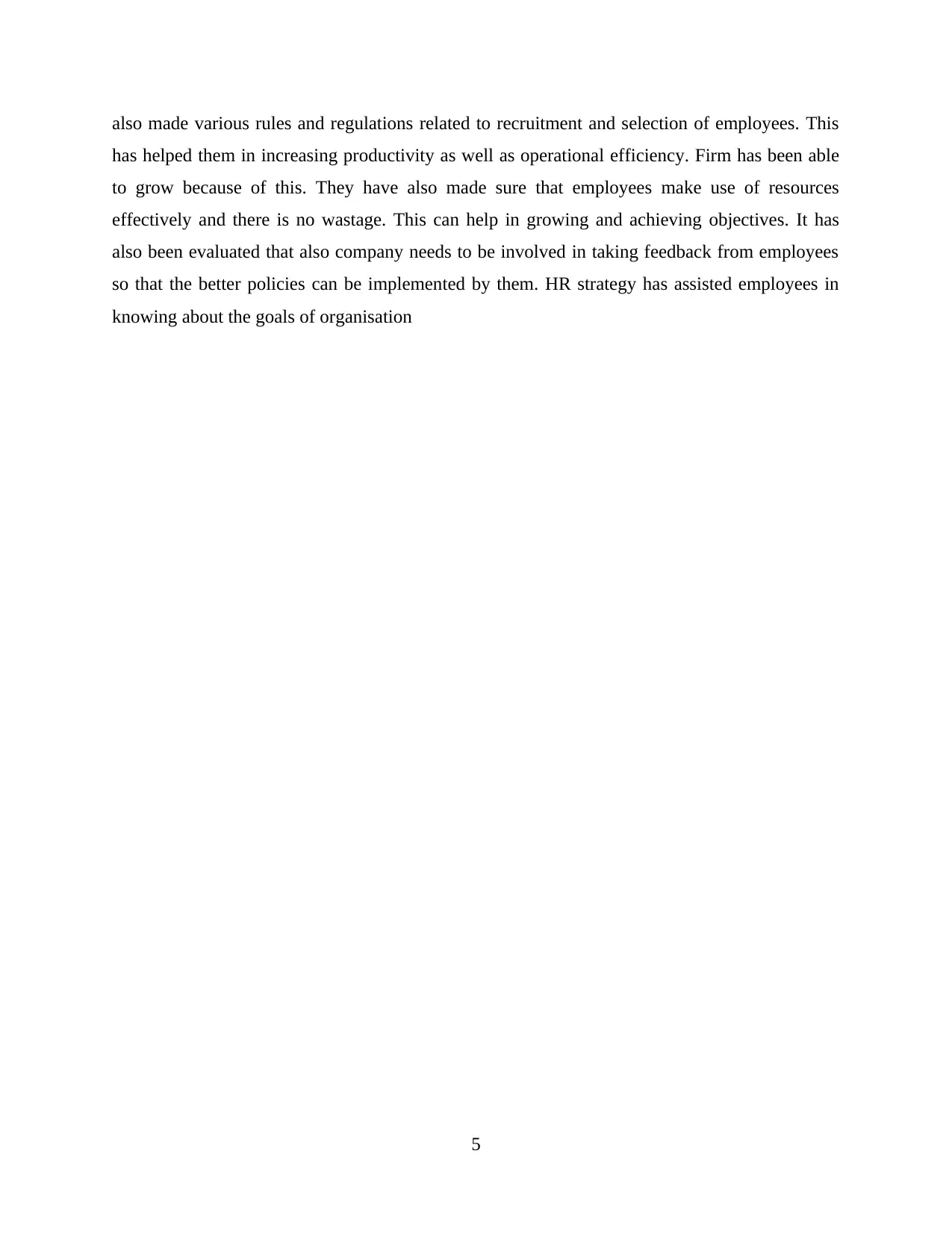
also made various rules and regulations related to recruitment and selection of employees. This
has helped them in increasing productivity as well as operational efficiency. Firm has been able
to grow because of this. They have also made sure that employees make use of resources
effectively and there is no wastage. This can help in growing and achieving objectives. It has
also been evaluated that also company needs to be involved in taking feedback from employees
so that the better policies can be implemented by them. HR strategy has assisted employees in
knowing about the goals of organisation
5
has helped them in increasing productivity as well as operational efficiency. Firm has been able
to grow because of this. They have also made sure that employees make use of resources
effectively and there is no wastage. This can help in growing and achieving objectives. It has
also been evaluated that also company needs to be involved in taking feedback from employees
so that the better policies can be implemented by them. HR strategy has assisted employees in
knowing about the goals of organisation
5
Paraphrase This Document
Need a fresh take? Get an instant paraphrase of this document with our AI Paraphraser
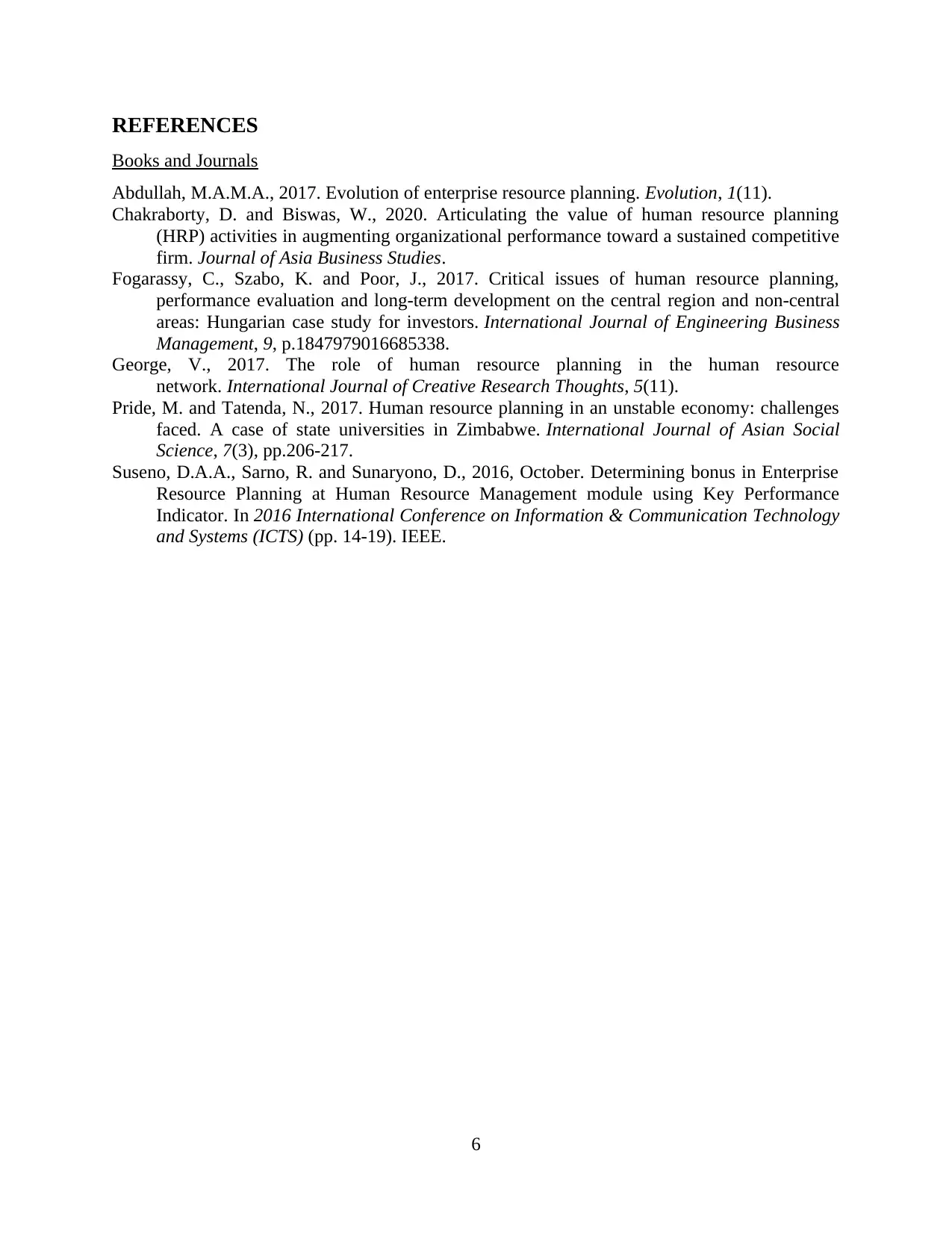
REFERENCES
Books and Journals
Abdullah, M.A.M.A., 2017. Evolution of enterprise resource planning. Evolution, 1(11).
Chakraborty, D. and Biswas, W., 2020. Articulating the value of human resource planning
(HRP) activities in augmenting organizational performance toward a sustained competitive
firm. Journal of Asia Business Studies.
Fogarassy, C., Szabo, K. and Poor, J., 2017. Critical issues of human resource planning,
performance evaluation and long-term development on the central region and non-central
areas: Hungarian case study for investors. International Journal of Engineering Business
Management, 9, p.1847979016685338.
George, V., 2017. The role of human resource planning in the human resource
network. International Journal of Creative Research Thoughts, 5(11).
Pride, M. and Tatenda, N., 2017. Human resource planning in an unstable economy: challenges
faced. A case of state universities in Zimbabwe. International Journal of Asian Social
Science, 7(3), pp.206-217.
Suseno, D.A.A., Sarno, R. and Sunaryono, D., 2016, October. Determining bonus in Enterprise
Resource Planning at Human Resource Management module using Key Performance
Indicator. In 2016 International Conference on Information & Communication Technology
and Systems (ICTS) (pp. 14-19). IEEE.
6
Books and Journals
Abdullah, M.A.M.A., 2017. Evolution of enterprise resource planning. Evolution, 1(11).
Chakraborty, D. and Biswas, W., 2020. Articulating the value of human resource planning
(HRP) activities in augmenting organizational performance toward a sustained competitive
firm. Journal of Asia Business Studies.
Fogarassy, C., Szabo, K. and Poor, J., 2017. Critical issues of human resource planning,
performance evaluation and long-term development on the central region and non-central
areas: Hungarian case study for investors. International Journal of Engineering Business
Management, 9, p.1847979016685338.
George, V., 2017. The role of human resource planning in the human resource
network. International Journal of Creative Research Thoughts, 5(11).
Pride, M. and Tatenda, N., 2017. Human resource planning in an unstable economy: challenges
faced. A case of state universities in Zimbabwe. International Journal of Asian Social
Science, 7(3), pp.206-217.
Suseno, D.A.A., Sarno, R. and Sunaryono, D., 2016, October. Determining bonus in Enterprise
Resource Planning at Human Resource Management module using Key Performance
Indicator. In 2016 International Conference on Information & Communication Technology
and Systems (ICTS) (pp. 14-19). IEEE.
6
1 out of 8
Related Documents
Your All-in-One AI-Powered Toolkit for Academic Success.
+13062052269
info@desklib.com
Available 24*7 on WhatsApp / Email
![[object Object]](/_next/static/media/star-bottom.7253800d.svg)
Unlock your academic potential
Copyright © 2020–2026 A2Z Services. All Rights Reserved. Developed and managed by ZUCOL.





